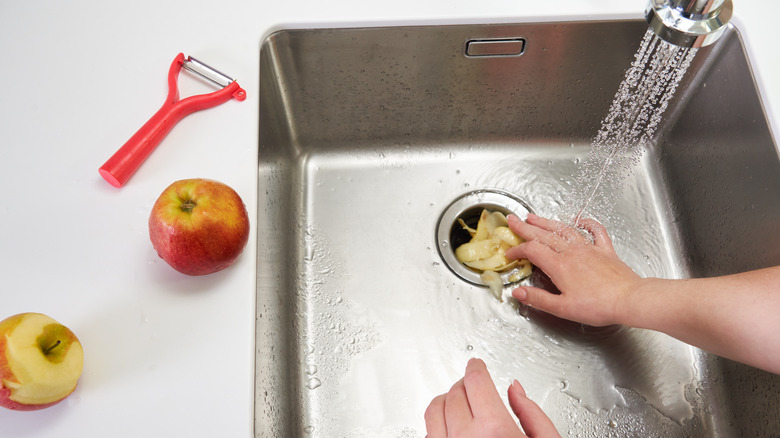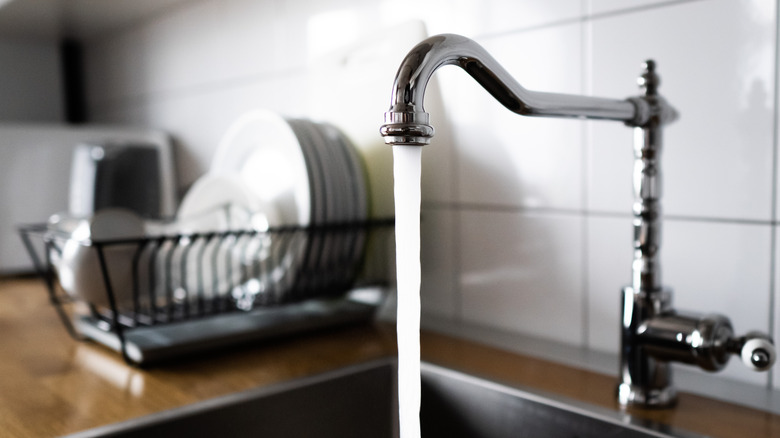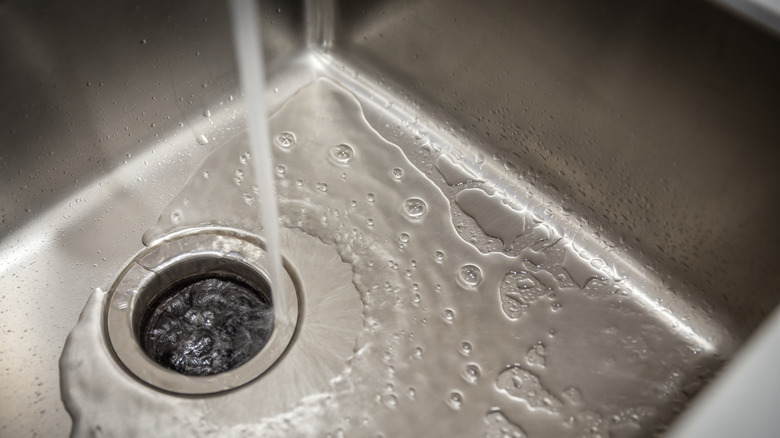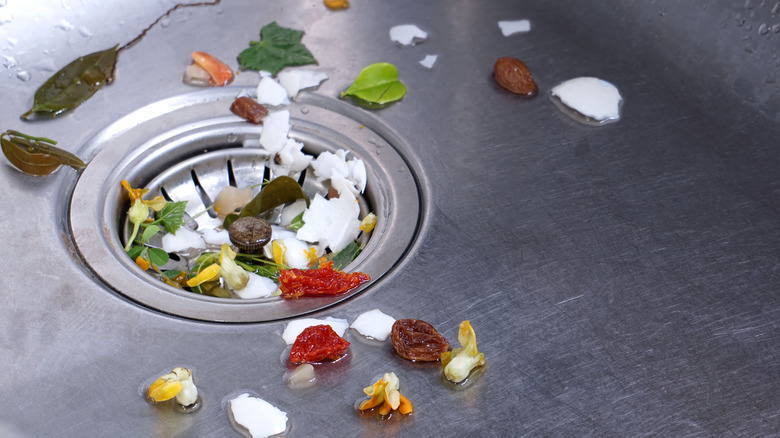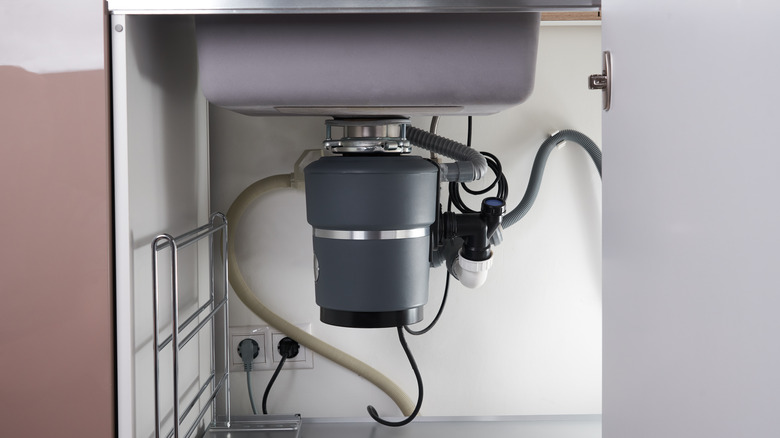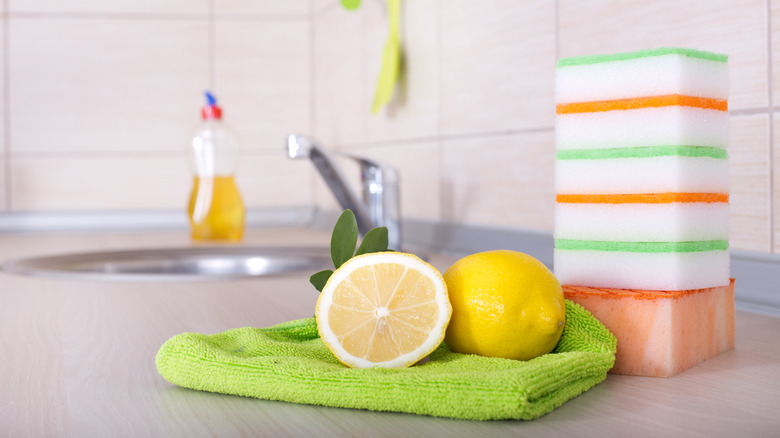Mistakes Everyone Makes When Using The Garbage Disposal
The pure convenience of a garbage disposal is as double-edged as the blades it comes with. One minute, you're tossing leftovers with reckless abandon, now that there's no need to worry about animals munching through the trash bags left outdoors. And the next, you're probably calling a plumber begging for an emergency visit because your sink is backed up and full of said leftovers.
Depending on the problem at hand, fixing a garbage disposal can cost homeowners a decent amount of money. HomeAdvisor reported that the average repair is a manageable $250, but it can quickly creep up to $400 based on the required labor or materials. Oftentimes, it's even necessary to replace the unit — but when it comes to saving time and effort during cleanup and keeping your trash smelling clean (and not like, well, trash), the upkeep may just be worth it.
Padding out your emergency funds for the time(s) your garbage disposal inevitably goes haywire is a smart idea, but some of the most common issues are actually completely avoidable mistakes. There are the obvious ones — like please, please, please do not put your hand down the disposal without unplugging it first — but read on for a few lesser-known tips that may just save your future plumbing budget.
Cold water is key to lengthening a garbage disposal's lifespan
Running the disposal? Then avoid hot water at all costs. It seems counterintuitive, and that's likely why this is one of the most little-known tips when it comes to maintaining your garbage disposal. Using hot water actually runs the risk of creating a blockage, since the heat can melt down any greasy foods, leading to a build-up over time. Instead, run cold water prior to dropping food down the disposal. The cold water will break down any fats much quicker, lessening the possibility for a plumbing call later on (via Preferred Plumbing & Drain).
And, whatever you do, definitely don't run the disposal when it's completely dry. While using hot water can lead to more clogging, using no water at all can do the exact same. Without a little bit of lubrication, small bits of food can get caught on the blades and never make their way down the drain, explained Dependable Service Plumbing & Air.
When it doubt, let your water run a little longer
Since the garbage disposal is built into your sink, it's easy to forget that it's a real (and breakable) appliance, just like your fancy fridge or pride and joy of a dishwasher. And if you've ever overloaded your fridge on a hot summer day, then you know just how quickly appliances can break under pressure.
If you want to avoid any undue stress on your garbage disposal (aside from the typical Chinese leftovers that are usually clogging it, of course), then be patient when running it. Sure, the ear-piercing sound of food being ground up is one of the worst sounds known to humankind, but it's survivable for a minute or two — especially if it means preventing additional upkeep in the future.
Hedrick's Service Now recommended a standard routine, starting with running cold water to get all the food down the drain. Once that's steady, toss on the disposal for about one minute, or however long it takes to get things going and gone. Always leave the water on for a bit after turning off the disposal, as this will ensure that everything is fully cleared out, so that you don't have any looming odors or annoying insects crawling around the sink thanks to a half-complete job.
Your garbage disposal isn't a secondary trash can
This is the golden rule of garbage disposals, and yet, it comes up time and time again: The sink is not a trash can! All food waste is not created equal. Some things might be fair game down the drain, but others may mean disaster for your plumbing.
Bob Vila recommended only putting soft foods and ice cubes in the disposal. And yet still, to protect the lifespan of your garbage disposal, it's best to cut all food up into the smallest chunks possible before flipping the switch.
According to Hedrick's Service Now, you should steer clear of anything greasy or oily — especially if you haven't kicked the hot water habit we talked about earlier. Make sure all bones, fruit pits, rogue plastic utensils, and fibrous and starchy veggies make their way into the real trash can. If you ever stop and question whether or not something can go into the garbage disposal, it's probably best to just skip it and go old school. Otherwise, you may end up with a clog sink of now-pureed Brussels sprouts on Thanksgiving morning.
While it might be tempting to simply store some old scraps down the sink, and run it now and again at the end of the day, it can become a source for bugs and pests the longer the food sits, per Preferred Plumbing & Drain. Instead, opt for a regular disposal schedule to avoid a bigger problem down the line.
There's a fine line between using your disposal too much and not enough
We've covered what happens when you don't run your disposal until the end of the day, but what about those of us who forget about Thursday night's dinner in the drain over a lazy weekend of takeout ... or longer?
Mike's Plumbing cautioned that letting the disposal sit for too long, with or without food in it, can jeopardize the lifespan. Without being put to use, your disposal won't start up properly after a bit of time off or it can even wear down due to deterioration.
On the flip side, try not to use the disposal for every last bit of food that makes its way into the sink. Mike's Plumbing suggested not using it whenever you run the water into the sink, since this can eventually wear down the motor, leading to a costly replacement far earlier than you budgeted for. It's a fine line, but all it takes is a little bit of mindfulness to avoid this common mistake.
Keep up with cleaning your garbage disposal
Despite being one of the most sought-after kitchen features, a garbage disposal just isn't as easy as flipping a switch now and again. It's painfully ironic, but a disposal can actually lean towards high maintenance. (But can't we all?) The very invention intended to save you time during cleanup may just require a bit more extra attention on the regular, but it's nothing the average homeowner can't handle, so long as you're aware of the common mistakes to avoid.
Now that we've accepted this, as well as the fact that the garbage disposal is an appliance (and not a secondary trash can), we can move on with our regularly scheduled maintenance.
You should avoid commercial cleaners and bleach, since the disposal can spit up at you, leading to an eye injury (and a problem significantly worse than a smelly sink). Bob Vila recommended making sure your garbage disposal is as clean as possible at least every two weeks. Start with an abrasive mixture like rock salt and ice cubes, then once that's had a solid run, pour some vinegar and baking soda down the drain to seal the deal.
You can even add some lemon down the drain to really eliminate any gross odors. Just be sure to be mindful and cut them into super small pieces, now that we know the damage any old food can do!
